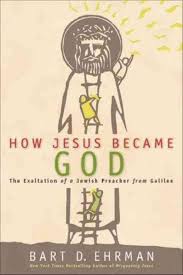According to Levenson the central elements of the Christian message derive from a reinterpretation and midrashic reworking of prominent tropes in the Hebrew Scriptures. In particular, the central Christian message and characterization of Jesus can be traced directly to the central motifs that lie at the heart of the old biblical stories and proclamations about the “beloved (and only begotten) son”. Further, these biblical stories have their antecedents in Canaanite mythology. The fundamental theme involves a father (human or divine) who willingly gives up his most beloved son to a bloody sacrifice, either out of love for another, or to save others from death. This is found most prominently in what have come to us as the writings of Paul, as well as in one especially famous gospel verse.
There is another parallel set of “beloved son” narratives that turn on the murderous hostility of the older siblings of that beloved son because of his destiny to inherit what they think should be their due. In this tradition, the father is an unwilling participant until the eventual miraculous return of his most beloved one. At that point the most favoured son assumes the full inheritance. Sometimes, but not always, there is reconciliation with the older siblings. This narrative enters the Christian message through certain plot and character details and another famous parable found in the synoptic gospels.
But at this point, in the series outlining Levenson’s book, ‘The Death and Resurrection of the Beloved Son, we come to his final chapter where he begins by looking at how the very character of God was transformed by early Christianity through its midrashic reading of the Jewish scripture stories of “the beloved son”. As previous posts in this series demonstrate, the “beloved son” trope, also often accompanied with the notion of “the only begotten” son, is part and parcel with the plot or myth of the father delivering up his most favoured offspring to bloody sacrifice for a greater good.
This ancient Jewish (and earlier Canaanite) story, Levenson proposes, is the underlying source of the Christian message, beginning with the very concept of God as a being who loves humanity so much he will sacrifice his only son to save them. . . .
Note the Hebrew Scripture themes that underly this passage in Romans 8:28-35:
And we know that God causes all things to work together for good to those who love God, to those who are called according to His purpose. For those whom He foreknew, He also predestined to become conformed to the image of His Son, so that He would bethe firstborn among many brethren; and these whom He predestined, He also called; and these whom He called, He also justified; and these whom He justified, He also glorified. What then shall we say to these things? If God is for us, who is against us? He who did not spare His own Son, but delivered Him over for us all, how will He not also with Him freely give us all things? Who will bring a charge against God’s elect? God is the one who justifies; who is the one who condemns? Christ Jesus is He who died, yes, rather who was raised, who is at the right hand of God, who also intercedes for us. Who will separate us from the love of Christ? Will tribulation, or distress, or persecution, or famine, or nakedness, or peril, or sword?
The complex thoughts expressed in this passage are all surfacing here from Jewish scripture narratives:
The firstborn son
- In the context of the narratives in the Jewish scriptures, the firstborn son was the one destined to be given to God as a sacrifice, or through a ritual that substitutes for a literal sacrifice (see beloved and only begotten sons sacrificed, and Jesus displaces Isaac);
- Sometimes (e.g. Jacob and Joseph) he is really the last born, and acquires his firstborn status through divine or parental assistance, or through birth to a favoured wife, and must accordingly face the murderous rage of his older brothers.
The image (eikon) of his Son
- This metaphor builds on the tradition that God created the individual man Adam in his own image, and that we are all in that image through procreation, the process blessed at creation;
- Now the image of God is no longer mediated through Adam, but through Jesus, through supernatural regeneration that was manifested at Jesus’ death and resurrection. This is available only to those called and chosen. Jesus is the new Adam.
The Isaac motifs
The constellation of the first born son, predestination, chosenness, glorification — this combination is at the core of the Isaac story. Anyone familiar with the Jewish scriptures will not have the story of Isaac and other beloved sons catapulted to firstborn status far from mind when reading here of the plot of the firstborn experiencing predestination, being chosen and finally glorified. This pattern is the core of Isaac’s birth, near-sacrifice and ascent to the rank of patriarch. And in later Jewish interpretations, his near-sacrifice became in implied actual sacrifice and resurrection. (See the previous posts for details.)
Abraham maybe
The above passage stresses the love of God, and since in Jewish Scripture and Second Temple interpretations Abraham was the archetypical lover of God, his shadow may well cover the above passage:
Isaiah 41:8 — Abraham is known as the archetypical lover of God. (Below is a translation of the Hebrew; in the LXX the word is from the Greek “agape” for love (agapete), describing God as the lover of Abraham):
— And thou, O Israel, My servant, Jacob, whom I have chosen, Seed of Abraham, My lover
Jubilees 17:15-18 While the original Genesis account spoke of Abraham’s fear of God, this passage from Jubilees points to a shift in Jewish interpretation of Abraham where it was his love for God that was stressed, and with everything working out well for him despite afflictions because of his love for God:
there were voices in heaven regarding Abraham, that he was faithful in all that He told him, and that he loved the Lord, and that in every affliction he was faithful. And the prince Mastema came and said before God, ‘Behold, Abraham loves Isaac his son, and he delights in him above all things else; bid him offer him as a burnt-offering on the altar, and Thou wilt see if he will do this command, and Thou wilt know if he is faithful in everything wherein Thou dost try him. And the Lord knew that Abraham was faithful in all his afflictions; for He had tried him through his country and with famine, and had tried him with the wealth of kings, and had tried him again through his wife, when she was torn (from him), and with circumcision; and had tried him through Ishmael and Hagar, his maid-servant, when he sent them away. And in everything wherein He had tried him, he was found faithful, and his soul was not impatient, and he was not slow to act; for he was faithful and a lover of the Lord.
Everything worked out well for Abraham because of his love for God.
Abraham definitely
The shadows of Abraham’s character lurking in the above passage are confirmed as definitely his own when we read of the final test, the real proof, of God’s love:
He who did not spare (pheidomai) His own Son, but delivered Him over for us all
Compare Genesis 22:12, 16:
for now I am certain that the fear of God is in your heart, because you have not kept back (pheidomai) your son, your only son, from me. . . . because you have done this and have not kept back (pheidomai) from me your dearly loved only son
The evidence of God’s love for humanity is the same as was the evidence of Abraham’s love for God. In both cases the supreme test or sign of that love was the giving up of their only sons.
Through this model of Abraham God has established a “new aqedah” (binding of Isaac). Just as Abraham’s aqedah enabled the life of the nation of Israel (see previous posts), so the new aqedah by God, in return, enables the new life of the Christian.
Role of Love in the New Aqedah
For God so loved the world, that He gave (edoken) His only begotten Son, that whoever believes in Him shall not perish, but have eternal life. (John 3:16)
Familiarity makes for an easy sentimentalization of this passage. But the idea of “givine one’s only begotten son” is nothing less than the scriptural idea of God’s requirement that the firstborn son be handed over (given up) for a bloody sacrifice. The way the Son is “given” goes back to Exodus 22:29b:
you shall give me the first-born among your sons
The fathers gift is the bloody slaying of Jesus, in the same sense as the killing of the passover lamb.
The killing of Jesus, like the killing of the passover lamb, enables the life of others who were marked for death. And like the beloved sons in the Hebrew traditions, his death also proves reversible. He is, like them, miraculously restored to life and reunited with those who love him, but who had given up all hope for his return.
Linking the above to a new age and general resurrection
Whence the pivotal historical moment, the turning of the new age interpretation of Jesus’ death and resurrection? That comes from Jewish apocalyptic, not from the midrash of biblical stories of near loss and miraculous return of the beloved son.
But the resurrection idea came with the Pharisees and the rabbis who followed them. It was not part of the earliest biblical narratives. But imagine how the Pharisees and rabbis who believed in a resurrection must have read and thought about the stories of the beloved son. One can imagine the old stories being recast under the impact of that new belief, of the old stories of an averted death being recast as a resurrection. Levenson had earlier discussed the enigmatic appearance of “the ashes of Isaac” in the Second Temple period.
The story of Elisha and the Shunammite woman in 2 Kings 4:8-37 (cf 1 Kings 17:17-24) likely represents a reworking of the beloved son story in a different cultural context, with a belief in resurrection.
Given these resurrection stories in the Elijah-Elisha narratives, it may indeed be significant that the first gospel, the Gospel of Mark, is quite possibly modeled on much of the content and structure of the Elijah-Elishah saga (1 Kings 17 – 2 Kings 13). Levenson cites Roth, and I would add Brodie. Levenson comments:
Even those unpersuaded by the case must conclude theis: if already in a world in which people believed in wonder-working prophets, the death of the only and promised son could be reversed by his bodily resurrection, it is all the more the case that in a world in which the resurrection of the dead is a central tenet, like that of Pharisaic Judaism, the report of the son’s return from death need not be taken for a definitive break with the older pattern. The report of Jesus’ resurrection is the old wine in a bottle that is relatively new but hardly unique. (p. 224, my emphasis)
Both Canaanite and Jewish myths
As discussed in the earlier posts in this series, there was the old Canaanite theme of god, El, who offered his son, his only son, in order to avert disaster. This offered son was said to be the “monogenes“, the “only” son, or the “only begotten” son.
Philo of Byblos translates the name of the son of El, whom El offered, as Ieoud or Iedoud. Behind this Ieoud/Iedoud is the Hebrew word yahid, the favoured one, the same term repeatedly applied to Isaac:
Take now thy son, thine only son, whom thou lovest, even Isaac . . .
thou hast not withheld thy son, thine only son, from me. . . .
because thou . . . hast not withheld thy son, thine only son . . (Genesis 22:2, 12, 16):
One LXX translation of this word uses the Greek monogenes when it applies to Jephthah’s daughter in Judges 11:34. Another LXX version combines monogenes auto agapete (she was his “only child and beloved” daughter).
So the resonances of Jewish and Canaanite myths lurk beneath the Christian message (outlined in the Romans passage at the beginning of this post) and the Christian God, although the Jewish myth of course dominates. In the Jewish myth the motive for giving up the beloved son was a love greater than that for the son, not fear of calamity, as was the motive in the Canaanite myth.
And when Jesus was the one identified as the son of the God, then God himself was transformed into the image of father Abraham.
I titled this post “remaking god in the image of abraham”, but I am not sure to what extent there was any real “re-make” — or if the remake was really about shifting the image of a godfather god who demands absolute fealty to one who guises that mafia-like godfather image beneath a “love” garment. Rather than a theological innovation, does the new myth represent a Stockholm syndrome — those who saw themselves captive to their godfather have come to love him, since they see themselves as totally dependent on him.
one more post to go ( i think) to finish off this series……
Like this:
Like Loading...



